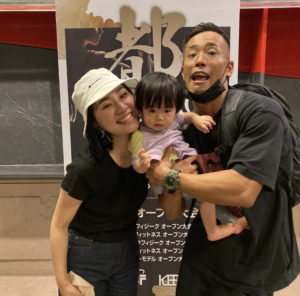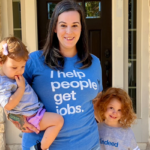
Becoming a parent can be a time of great joy and anticipation, but also a time of anxiety and concern, where you wonder how you’ll be able to balance work and childcare, or how your career will be impacted. In this blog, you’ll find out how new parents at Indeed have overcome challenges and adjusted to life as working parents.
—
We brought together three parents who returned to work after taking parental leave and asked them to share their opinions and advice based on their own experiences of balancing work and childcare, feelings of anxiety when returning to work, and changes in how they perceive their careers and work lives now. Whether you are currently raising a child yourself, or you have a member on your team that is raising a child, this discussion provides helpful insight into the world of working parents.
In this session, we spoke to:
Terumi —Sales Team Lead
- Joined the company in 2014 as a part of the Sales team. Responsible for Agency Relations as a Team Lead.
- Took maternity leave from February 2018 for two and a half years.
- Mother to a sweet 4-year-old boy.
Shunsuke —Client Success Manager
- Joined the company in 2017. Responsible for recruitment support for SMEs. Manages a team of 10 people.
- Took parental leave for six months from June 2021.
- Doting father to a 1-year-old son.
Osamu — Senior Sales Director
- Joined the company in 2016. As a Senior Director, he manages 9 directors, while driving the Sales team with strategic planning.
- Took parental leave for one month in February 2022.
- Has 2 sons who are3-years-old and 6-months-old
“Will I still fit in?”
Q. Did you have any anxiety or concerns about taking parental leave, or balancing childcare with work?
Terumi: I took two and a half years of maternity leave. I was away from work for such a long period of time, and with this being such an ever-changing company, I remember feeling anxious, wondering “Will I still fit in even after I return to work?” However, it helped that colleagues would contact me on social media during my leave. They sent messages like “We’re looking forward to seeing you again!” It made me feel really happy, and I looked forward to returning to work.
Osamu: My wife stays home, so at first, I wasn’t sure if I should be taking parental leave. My position means that I am responsible for a whole division, so each day I would receive dozens of messages in Slack asking for approval or for me to make a decision about something, so I thought “What will happen to my team if I leave?” But I also thought, “I wouldn’t know what will happen if I take leave unless I actually take leave. So, let’s see what happens,” and decided to take the parental leave. In the end, I’m glad that I did take parental leave.
Shunsuke: I was also looking after a big team I took a slightly longer six months of childcare leave, including Indeed Parental Leave. However, I didn’t feel much anxiety about temporarily leaving the organization. That is to say, I wanted to spend time laying the groundwork for operations to be more autonomous, so it was also an opportunity to say to all the team members, “While I’m away, I’m putting you in charge of the organization, so I want everyone to do their best, with the Team Leads taking the helm.”
Creating a better workplace by discussing the difficulties of being a working parent
Q. Do you have any useful tips for balancing childcare and work?
Terumi: I feel that it’s probably also better for a mother’s mental health to return to work rather than to stay on maternity leave. During maternity leave, I was 100% preoccupied with my child. However, when you start working again, you also have time to be in “work mode.” I think that change can be refreshing. Thinking about the same thing for 24 hours straight is just exhausting. During work hours, I forget about my child for a moment and just focus on what’s in front of me, and then after work, I can put everything into enjoying my time with my family. It’s important to switch between work and time with my family and to carefully consider how you spend your time. That’s how I maintain balance.
Osamu: I think it’s important not to have an inflated sense of responsibility

where you think “I have to do everything myself.” You can’t do everything perfectly, and there’s also no reason to think you can do everything yourself. I think this principle applies both at work and at home. I think changing your own way of working in the workplace can be a major undertaking, but it’s also essential to get support and understanding from your coworkers. To that end, I think it’s important to openly communicate with them about your current situation, and to inform people of your schedule in advance, including family, so you can find help where needed in advance.
Shunsuke: I agree that it’s important to communicate my own situation when raising a child, as well as what things with childcare are difficult. When I’m taking part in an online meeting from home, my child will often start crying or messing around with the computer when I try to talk. Previously I tried to hide it because I thought it wouldn’t be good to have my childcare arrangements interfering with work. However one day, one of my team members said to me “If you show us exactly how difficult it is to raise a child, then we’ll all understand a bit more, and then we can think about how we want to work together and make adjustments.” I was so grateful for their kind words and learned that communicating openly without concealing your difficulties makes for a better work environment.
What is my reason for working? What kind of life do I want to live?
Q. Comparing before and after having children, have you noticed any changes in how you view your career, or how you approach work?
Osamu: The main purpose of why I work has completely changed. Previously, I would work hard for my own pride and self-fulfillment, but after having children, I wondered why I was working so hard. If you ask me now, I can clearly say that I’m doing it for my children and my family, and I want to be a parent that my children are proud of. I started thinking about how I should behave and what I should do at work in order to make my children proud.
Shunsuke: I contemplated what it means to be a parent, and I realized my attitude towards work changed. These days, my attitude to indulge without compromise has become stronger than ever. Now that I’m raising a child, I feel that time is limited. Life is not just about working and raising children. My own time is also important and, after reconsidering what I want to value and prioritize, I am realigning the way I work and live. I feel that raising a child has been a great way for me to rediscover how I live my life.
Terumi: I also feel that time is limited, and it made me start to think more seriously about my career. How should I use my limited time going forward, taking into account the increasing amount of time dedicated to my child? I started to wonder about the kind of life I wanted to lead. When I think about the future, I increasingly feel that I want to learn more, so I try to create opportunities to spend some time learning outside the company and also to take on new challenges.
What is the best choice for you and your family?
Q. Finally, do you have any advice for other working parents?
Terumi: Children grow up so quickly. Spending quality time with my child is a good opportunity to gain irreplaceable insights. So, I really feel that the time spent raising children is time that also allows me to grow even more than I expected, and it is also an opportunity to realize my own potential. Although you may get anxious, there are so many things that you can take advantage of, such as internal programs or various external services. You should definitely consider making use of these.
Osamu: Childcare is important work. I think of it as a mission. However, doing it perfectly is impossible. Since it can’t be done perfectly, you should just simply do your best, while at the same time dividing up tasks properly within your family, asking colleagues for help, or making use of external support services. There’s no reason to feel guilty or to shy away from asking for help, or making use of the internal programs.
Shunsuke: Should you take parental leave? When you start thinking about it, you may feel nervous that the longer you go on leave, the fewer opportunities for growth you’ll have when you come back, and the slower your career will progress. I think, in 5 or 10 years time, you don’t want to be full of regret, thinking “Why didn’t I take leave back then?” Of course, the choices you make regarding you and your family’s lives are very personal. However, these precious, important moments in your life should not be swayed by these worries. I hope that you will be able to look at your family’s future and your own future in the long term and that you will be able to find the best choice.



